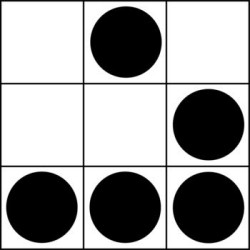-
Ace..
User deleted
Ho cominciato a fare anche c++, ecco cosa ho fatto: CODICE#include<iostream>
using namespace std;
main(){
int somma=0,num,x,y;
cin>>num;
x=y=num;
while (num>1){
while (x>1){
somma=somma+((x%2)*(x%2));
x=x/10;
}
if (somma==1){
break;
}
num=x=somma;
}
if (somma==1){
cout<<y<<" e' un numero felice"<<endl;
}
else{
cout<<y<<" non e' un numero felice"<<endl;
}
system("Pause");
return 0;
}. -
lumo.
User deleted
Ace, se il numero non è felice il ciclo come fa ad interrompersi? . -
Ace..
User deleted
CITAZIONE (lumo @ 7/11/2009, 13:36)Ace, se il numero non è felice il ciclo come fa ad interrompersi?
Non so io ho provato a farlo come potevo
io ho provato a farlo come potevo  .
. -
Tankado©.
User deleted
Scusate se scrivo su una discussione vecchia. CODICEdef numero_felice(x,i):
i = input("Submit a number: ")
x = i**2
while (i > 1) :
x = [(x / 10)** 2] + [( x % 10) ** 2]
if ( x == 1 ):
return true
else:
return false. -
x-reynik-x.
User deleted
Così come l'hai postato non funzionerà mai...
EDIT: Intanto posto la mia soluzione, che non l'avevo fatto questo esercizio:SPOILER (click to view)CODICEdef felice(n):
blacklist = [4, 16, 37, 58, 89, 145, 42, 20]
if n in blacklist or n == 0:
return False
if n == 1:
return True
while True:
n2 = sum(int(i) ** 2 for i in str(n))
if n2 in blacklist:
return False
if n2 == 1:
return True
n = n2
Edited by x-reynik-x - 15/12/2010, 20:04. -
Tankado©.
User deleted
Perchè? . -
x-reynik-x.
User deleted
Perché è indentato male. . -
Tankado©.
User deleted
Puoi spiegarmi dove? . -
.
Non hai indentato le variabili x,i ed il ciclo. . -
Tankado©.
User deleted
Continuo a non capire...potresti farmi vedere dove sono gli errori?. -
x-reynik-x.
User deleted
Ma la stai leggendo una guida? È una cosa base l'indentazione...
È la stessa cosa che hai fatto con il ciclo while, lo fai anche con la funzione:CODEdef numero_felice(x,i):
i = input("Submit a number: ")
x = i**2
while (i > 1) :
x = [(x / 10)** 2] + [( x % 10) ** 2]
if ( x == 1 ):
return true
else:
return false
2°: in Python vero e falso sono maiuscoli, Python è Case-Sensitive;
3°: a che ti serve mettere come argomenti della funzione se poi li rimpiazzi con altri valori?
4°: le parentesi quadre indicano le liste, per l'aritmetica usi solo tonde
5°: e se il numero iniziale ha 3 o più cifre?
6°: anche con tutte queste modifiche non sono sicuro che funzioni, provalo! .
. -
x-reynik-x.
User deleted
Ah ancora una cosa: se tu metti quel else dopo l'if esci subito dal ciclo e non puoi continuare con il numero ottentuto.
Es. 7
7^2 = 49
49 != 1 allora esci e ritorni falso. Invece 7 è un numero felice, perché se continui:
4^2 + 9^2 = 97
9^2 + 7^2 = 130
1^2 + 3^2 + 02 = 10
1^2 + 0^2 = 1. -
kulky.
User deleted
#include<stdio.h>
#include<math.h>
int restituiscicifre(int *num)
{int res;
res=(*num) % 10;
*num =( (*num) / 10);
return res;
}
int sommacifre(int num)
{ int somma,temp;
somma=0;
while (num)
{ temp=restituiscicifre(&num);
somma=somma+temp*temp;
}
}
int isfelice(int num)
{ int somma;
somma=0;
while (num!=1 && num!=4)
{
num=sommacifre(num);
}
if (num==1)
return 1;
else
return 0;
}
void main()
{ int num,temp,somma,memoria;
for(memoria=2;memoria<1000;memoria++)
{ somma=0;
num=memoria;
if(isfelice(memoria) )
{
printf("felice %d \n",memoria);
}
}
getchar();
}CODICE#include<stdio.h>
#include<math.h>
int restituiscicifre(int *num)
{int res;
res=(*num) % 10;
*num =( (*num) / 10);
return res;
}
int sommacifre(int num)
{ int somma,temp;
somma=0;
while (num)
{ temp=restituiscicifre(&num);
somma=somma+temp*temp;
}
}
int isfelice(int num)
{ int somma;
somma=0;
while (num!=1 && num!=4)
{
num=sommacifre(num);
}
if (num==1)
return 1;
else
return 0;
}
void main()
{ int num,temp,somma,memoria;
for(memoria=2;memoria<1000;memoria++)
{ somma=0;
num=memoria;
if(isfelice(memoria) )
{
printf("felice %d \n",memoria);
}
}
getchar();
}. -
kulky.
User deleted
Ho modificato il codice: CODICE#include<stdio.h>
#include<math.h>
int restituiscicifre(int *num)
{int res;
res=(*num) % 10;
*num =( (*num) / 10);
return res;
}
int sommacifre(int num)
{ int somma,temp;
somma=0;
while (num)
{ temp=restituiscicifre(&num);
somma=somma+temp*temp;
}
}
int isfelice(int num)
{ while (num!=1 && num!=4)
{
num=sommacifre(num);
}
if (num==1)
return 1;
else
return 0;
}
void main()
{
int memoria;
for(memoria=2;memoria<1000;memoria++)
{
if(isfelice(memoria) )
{
printf("felice %d \n",memoria);
}
}
getchar();
}. -
Guglielmoqwerty.
User deleted
Questa invece è la mia soluzione 
Soluzione
Ne ho approfittato per utilizzare per la prima volta ArrayList
Secondo voi come si potrebbe migliorare? Mi sembra ci siano troppi cicli.....
Numeri felici |



 Contacts
Contacts Web
Web